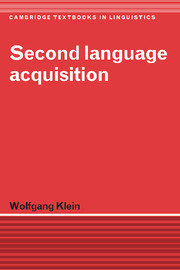Book contents
- Frontmatter
- Contents
- Preface
- PART I The process of language acquisition
- 1 Some forms of language acquisition, some fundamental facts, some focal issues, some well-known theories
- 2 Six dimensions of language acquisition
- 3 Some consequences for foreign language instruction
- PART II From the learner's point of view
- Conclusion
- Notes
- References
- Index of names
- Index of subjects
3 - Some consequences for foreign language instruction
Published online by Cambridge University Press: 05 June 2012
- Frontmatter
- Contents
- Preface
- PART I The process of language acquisition
- 1 Some forms of language acquisition, some fundamental facts, some focal issues, some well-known theories
- 2 Six dimensions of language acquisition
- 3 Some consequences for foreign language instruction
- PART II From the learner's point of view
- Conclusion
- Notes
- References
- Index of names
- Index of subjects
Summary
This book is concerned with second language acquisition, not with foreign language teaching (for an excellent survey of the present state of this field, see Els et al., 1984; see also Faerch, Haastrup and Philipson, 1984). It might be useful, however, to see what our general view of language acquisition suggests for the broad field of second language instruction.
The picture of language acquisition which emerges from the preceding chapter is that of a quite complex process which systematically develops under the influence of a set of factors. What changes in the course of this process are parts of the language processor, i.e. the learner's faculty of producing and comprehending utterances in a given context. Exposed to the pressure of driving agents subsumed by the term ‘propensity’, the language processor is set to work on the novel linguistic material, adjusting its potentialities in the process and invoking all available knowledge for this purpose.
It is perfectly possible to influence, within certain limits, the structure, the tempo, and the termination of the acquisition process. The obvious way to do this consists in trying to control skilfully the interactive influence of the various factors. It is clear that the various factors differ in the degree to which they are amenable to this control. The factor easiest to control is access, from the point of view of the input as well as of opportunity to communicate.
- Type
- Chapter
- Information
- Second Language Acquisition , pp. 53 - 56Publisher: Cambridge University PressPrint publication year: 1986



